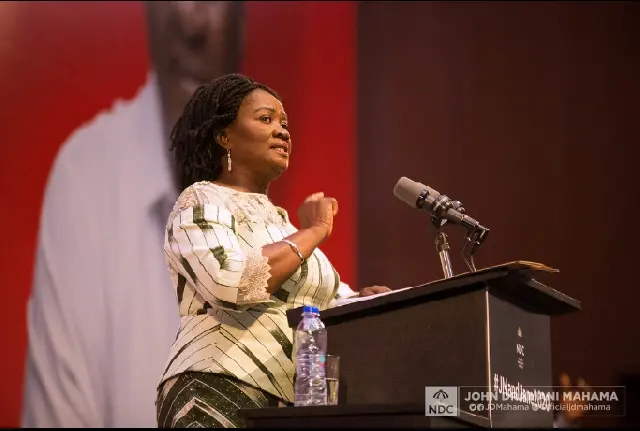IWD: Early marriages, gender-based violence inhibiting release of full potential of women – Opoku-Agyemang
Former Minister of Education Professor Naana Jane Opoku-Agyemang has commended all women on the occasion of International Women’s Day (IWD) on Wednesday, March 8.

In a tweet, the Vice Presidential Candidate for the National Democratic Congress (NDC) in the 2020 elections said “This is to salute all women and to express profound gratitude for those invaluable legacies of sacrifice, tenacity, and sheer hard work which have brought our nation this far. Ayeko
“However there remain so much we must and can do to remove the barriers that continue to inhibit the release of our full potential to even more effectively impact our nation, community, family and self.
“These include teenage pregnancies, early marriages, gender-based violence in institutions and workplaces; high drop out rates from educational and training facilities, lack of opportunity for advancement in many spheres.
“We must soldier on, pulling ourselves and others along to uphold, uplift, transform, inspire! Happy Women’s Day to each and all.”
We must soldier on, pulling ourselves and others along to uphold, uplift, transform, inspire!
Happy Women’s Day to each and all.
/4— Professor Naana Jane Opoku-Agyemang (@NJOAgyemang) March 8, 2023
International Women’s Day is a global holiday celebrated annually on March 8 as a focal point in the women’s rights movement, bringing attention to issues such as gender equality, reproductive rights, and violence and abuse against women.
The Regional Director for Africa, World Health Organization Dr Matshidiso Moeti also said on the occasion that this year’s theme, “Digital: Innovation and technology for gender equality,” highlights the role of innovative technology in promoting gender equality and meeting the health and developmental needs of women and girls.
Globally, the increasing number and use of mobile phones and internet connectivity have facilitated access to health information and services.
The adoption of digital health and other technological innovations has positively impacted electronic medical records, health data management, security, and effective communication between health workers, patients, and community stakeholders.
Innovations have equally enhanced capacity building and knowledge translation through online training, webinars, and innovative tools for patient care—such as telemedicine, robotics, and artificial intelligence.
Efforts at innovation have facilitated improved access to quality healthcare services and encouraged the participation of individuals, families, and community stakeholders in health care, especially during the COVID-19 lockdowns.
We have seen that women can be innovators and contribute to transforming the health of all people on the continent.
In December 2018, we organized the first WHO Africa Innovation Challenge. It was a deliberate effort to find solutions to Africa’s unmet health needs and recognize home-grown innovations that could solve Africa’s health challenges.
More than a third of the over 2 400 submissions from 77 countries came from women-led enterprises, and one of them emerged among the top three awardees. We need to encourage and support such dedication.
“I’m glad to see the enthusiastic scale-up of ICT-based innovation deployed to fight COVID-19 and other diseases in the region. These include using drones in Ghana, Rwanda, Sierra Leone, South Africa and Malawi; robots for clinical assistance in Rwanda; satellite imagery-driven vulnerability mapping dashboards in Ghana, Nigeria and Sierra Leone; and WhatsApp Chatbots in South Africa.
“Similarly, Angola, Nigeria, Ethiopia and Uganda are using self-diagnostic tools, contact tracing apps, solar-powered automatic handwashing tools—to mention but a few. In the area of reproductive health, innovative technologies such as YeneHealth, a digital innovation supporting women to gain self-agency; Novi Guide 2.4, a neonatal application helping to recognize and act when danger signs are noticed; and Safe Delivery smartphone applications being tested in eight countries have shown added value to reproductive, maternal, newborn, child and adolescents services when deployed widely.
“Nevertheless, we must do more to remove the digital gender divide, mainly impacting vulnerable women and girls, especially those in rural and remote areas with low education and socioeconomic status. According to a 2021 report by the Association of Mobile Operators, inadequate infrastructure, lack of digital skills for the internet and ICTs, and gender-related barriers around access to and control over resources are the main obstacles to “meaningful connectivity” for women and girls,” she said.
She added “We can address this challenge by: Creating awareness about the digital gender divide. Advocating for policies and legal frameworks to keep women and girls safe. Promoting women’s participation in science, technology, and ICTs.
“By doing these, we will ensure that disadvantaged and vulnerable women and girls also benefit equitably from digital and technological innovations for their improved health and well-being. Let us also work to ensure that women and girls are safe online. This will free them from online gender-based violence, including cyberstalking, sexual harassment, trafficking, and gross breaches of privacy.
“As we celebrate International Women’s Day, I urge all stakeholders—from governments and partners to civil society and citizens—to support country-driven and gender-sensitive approaches to close the existing digital gender divide.”





Thank you for your sharing. I am worried that I lack creative ideas. It is your article that makes me full of hope. Thank you. But, I have a question, can you help me? https://www.binance.info/it/join?ref=S5H7X3LP
I feel that is one of the so much vital info for me. And i am glad studying your article. But want to commentary on few general things, The site style is ideal, the articles is really excellent : D. Excellent job, cheers
A person essentially lend a hand to make seriously articles I might state. This is the first time I frequented your web page and to this point? I surprised with the analysis you made to create this actual publish incredible. Fantastic process!
I will right away snatch your rss as I can’t in finding your e-mail subscription link or e-newsletter service. Do you have any? Please permit me realize so that I may just subscribe. Thanks.
Can you be more specific about the content of your article? After reading it, I still have some doubts. Hope you can help me.
Thank you for your sharing. I am worried that I lack creative ideas. It is your article that makes me full of hope. Thank you. But, I have a question, can you help me?
Thank you for your sharing. I am worried that I lack creative ideas. It is your article that makes me full of hope. Thank you. But, I have a question, can you help me?
Thanks for sharing. I read many of your blog posts, cool, your blog is very good.
I’ll right away grasp your rss as I can’t find your email subscription link or e-newsletter service. Do you’ve any? Kindly allow me recognise so that I may just subscribe. Thanks.
This really answered my problem, thank you!
I don’t think the title of your article matches the content lol. Just kidding, mainly because I had some doubts after reading the article.
Thanks for sharing. I read many of your blog posts, cool, your blog is very good.
Can you be more specific about the content of your article? After reading it, I still have some doubts. Hope you can help me.
Thanks for sharing. I read many of your blog posts, cool, your blog is very good.
Thanks for sharing. I read many of your blog posts, cool, your blog is very good.
Your article helped me a lot, is there any more related content? Thanks!
Thanks for sharing. I read many of your blog posts, cool, your blog is very good.
I don’t think the title of your article matches the content lol. Just kidding, mainly because I had some doubts after reading the article.
I don’t think the title of your article matches the content lol. Just kidding, mainly because I had some doubts after reading the article.
Thank you for your sharing. I am worried that I lack creative ideas. It is your article that makes me full of hope. Thank you. But, I have a question, can you help me?
I don’t think the title of your article matches the content lol. Just kidding, mainly because I had some doubts after reading the article. https://www.binance.com/ru-UA/register?ref=OMM3XK51
Your point of view caught my eye and was very interesting. Thanks. I have a question for you.
Your point of view caught my eye and was very interesting. Thanks. I have a question for you.
Thanks for sharing. I read many of your blog posts, cool, your blog is very good.
Your article helped me a lot, is there any more related content? Thanks!
Your point of view caught my eye and was very interesting. Thanks. I have a question for you.
Thanks for sharing. I read many of your blog posts, cool, your blog is very good.
Thanks for sharing. I read many of your blog posts, cool, your blog is very good. https://www.binance.info/en-IN/register?ref=A80YTPZ1
I don’t think the title of your article matches the content lol. Just kidding, mainly because I had some doubts after reading the article.
**mitolyn**
Mitolyn is a carefully developed, plant-based formula created to help support metabolic efficiency and encourage healthy, lasting weight management.
I do agree with all the ideas you’ve presented in your post. They are very convincing and will certainly work. Still, the posts are too short for novices. Could you please extend them a little from next time? Thanks for the post.
Thanks for sharing. I read many of your blog posts, cool, your blog is very good. https://www.binance.info/register?ref=IXBIAFVY
Thank you for your sharing. I am worried that I lack creative ideas. It is your article that makes me full of hope. Thank you. But, I have a question, can you help me? https://www.binance.info/en-NG/register?ref=YY80CKRN
I discovered your blog website on google and examine a couple of of your early posts. Proceed to keep up the very good operate. I just further up your RSS feed to my MSN News Reader. In search of forward to reading extra from you in a while!…
Your point of view caught my eye and was very interesting. Thanks. I have a question for you. https://accounts.binance.com/es-MX/register-person?ref=GJY4VW8W